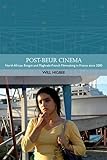Post-beur Cinema : North African Émigré and Maghrebi-French Filmmaking in France since 2000 / Will Higbee.
Material type: TextSeries: Traditions in World Cinema : TWCPublisher: Edinburgh : Edinburgh University Press, [2022]Copyright date: ©2013Description: 1 online resource (288 p.) : 21 B/W illustrationsContent type:
TextSeries: Traditions in World Cinema : TWCPublisher: Edinburgh : Edinburgh University Press, [2022]Copyright date: ©2013Description: 1 online resource (288 p.) : 21 B/W illustrationsContent type: - 9780748640041
- 9780748678150
- Motion picture industry -- History -- 21st century -- France
- Motion picture industry -- History -- 21st century -- France
- Motion picture industry -- France -- History -- 21st century
- Motion pictures -- History -- 21st century -- France
- Motion pictures -- France -- History -- 21st century
- North Africans in motion pictures
- Film, Media & Cultural Studies
- PERFORMING ARTS / Film & Video / History & Criticism
- 791.409 22/ger
- PN1993.5.F8 H54 2014
- online - DeGruyter
- Issued also in print.
| Item type | Current library | Call number | URL | Status | Notes | Barcode | |
|---|---|---|---|---|---|---|---|
 eBook
eBook
|
Biblioteca "Angelicum" Pont. Univ. S.Tommaso d'Aquino Nuvola online | online - DeGruyter (Browse shelf(Opens below)) | Online access | Not for loan (Accesso limitato) | Accesso per gli utenti autorizzati / Access for authorized users | (dgr)9780748678150 |
Browsing Biblioteca "Angelicum" Pont. Univ. S.Tommaso d'Aquino shelves, Shelving location: Nuvola online Close shelf browser (Hides shelf browser)

|

|

|

|

|

|

|
||
| online - DeGruyter Far-Flung Families in Film : The Diasporic Family in Contemporary European Cinema / | online - DeGruyter The Arab Nahdah : The Making of the Intellectual and Humanist Movement / | online - DeGruyter Language Acquisition and Change : A Morphosyntactic Perspective / | online - DeGruyter Post-beur Cinema : North African Émigré and Maghrebi-French Filmmaking in France since 2000 / | online - DeGruyter The TV Crime Drama / | online - DeGruyter Muslim Spain Reconsidered : From 711 to 1502 / | online - DeGruyter Language Planning as a Sociolinguistic Experiment : The Case of Modern Norwegian / |
Frontmatter -- Contents -- Acknowledgements -- List of Illustrations -- 1. Introduction: From Immigrant Cinema to National Cinema -- 2. The (Maghrebi-)French Connection: Diaspora goes Mainstream -- 3. Colonial Fracture and the Counter-Heritage Film -- 4. Of Spaces and Difference in the Films of Abdellatif Kechiche -- 5. Home, Displacement and the Myth of Return: Journey Narratives in the 2000s -- 6. Screening Islam: Cinematic Representations of the Muslim Community in France in the 2000s -- 7. Conclusion: Post-Beur Cinema -- Bibliography -- Index
restricted access online access with authorization star
http://purl.org/coar/access_right/c_16ec
A comparative analysis of Maghrebi-French and North African émigré cinema in FranceSince the early 1980s and the arrival of Beur cinema filmmakers of Maghrebi origin have made a key contribution French cinema's representation of issues such as immigration, integration and national identity. However, they have done so mostly from a position on the margins of the industry. In contrast, since the early 2000s, Maghrebi-French and North African émigré filmmakers have occupied an increasingly prominent position on both sides of the camera, announcing their presence on French screens in a wider range of genres and styles than ever before. This greater visibility and move to the mainstream has not, however, automatically meant that these films have lost any of the social or political relevance. Indeed in the 2000s many of these films have increasingly questioned the boundaries between national, transnational and diasporic cinema, whilst simultaneously demanding, either implicitly or explicitly, a reconsideration of the very difference that has traditionally been seen as a barrier to the successful integration of North African immigrants and their descendants into French society.Through a detailed study of this transformative decade for Maghrebi-French and North African émigré filmmaking in France, this book argues for the emergence of a 'Post-Beur' cinema in the 2000s that is simultaneously global and local in its outlook. Its key features include:A comprehensive overview of the key developments in Maghrebi-French and North African émigré filmmaking in France since the 2000s: counter-heritage cinema and the memorialisation of France's colonial past; journey narratives and the myth of return; the 'mainstreaming' of Maghrebi-French directors and stars; representations of Islam.Detailed case studies of key films from the 2000s that have yet to receive scholarly attention, such as Hors-la-loi, Dernier maquis and Vénus noire.An in-depth analysis of trends in production, distribution and exhibition as they relate to Maghrebi-French and North African émigré filmmakers in the 2000s.An absorbing introduction to this recent cinematic tradition, Post-Beur Cinema is essential reading for students and scholars in Film Studies, French Studies and Diaspora Studies.
Issued also in print.
Mode of access: Internet via World Wide Web.
In English.
Description based on online resource; title from PDF title page (publisher's Web site, viewed 24. Mai 2022)


